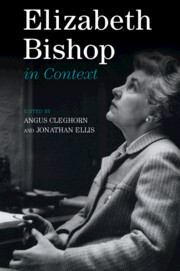Book contents
- Elizabeth Bishop in Context
- Elizabeth Bishop in Context
- Copyright page
- Contents
- Figure
- Contributors
- Acknowledgements
- Note on Referencing and Abbreviations
- Chronology
- Introduction
- Part I Places
- Part II Forms
- Part III Literary Contexts
- Part IV Politics, Society and Culture
- Part V Identity
- Chapter 25 Dreams
- Chapter 26 Humor
- Chapter 27 Gender
- Chapter 28 Queerness
- Chapter 29 Race
- Chapter 30 Nature
- Chapter 31 Animals
- Part VI Reception and Criticism
- Works Cited
- Index
Chapter 31 - Animals
from Part V - Identity
Published online by Cambridge University Press: 06 August 2021
- Elizabeth Bishop in Context
- Elizabeth Bishop in Context
- Copyright page
- Contents
- Figure
- Contributors
- Acknowledgements
- Note on Referencing and Abbreviations
- Chronology
- Introduction
- Part I Places
- Part II Forms
- Part III Literary Contexts
- Part IV Politics, Society and Culture
- Part V Identity
- Chapter 25 Dreams
- Chapter 26 Humor
- Chapter 27 Gender
- Chapter 28 Queerness
- Chapter 29 Race
- Chapter 30 Nature
- Chapter 31 Animals
- Part VI Reception and Criticism
- Works Cited
- Index
Summary
This chapter explores Elizabeth Bishop’s animal poems within an ecofeminist framework, referencing her subversion of traditional religious teachings when engaging with animal otherness. Bishop’s incarnations of female animals in “Brazil, January 1, 1502,” “The Moose” and “Pink Dog” are discussed in contention with her more typical casting of animals and nature as male. With a focus on “Rainy Season; Sub-Tropics,” her use of anthropomorphism and her manipulation of boundaries is suggested as a means of traversing the expectation of what is human and what is animal. Her encounters with animal otherness are considered as reaffirmations of human selfhood and, at the same time, as gestures toward an idea of spiritual otherness. The chapter culminates with an in-depth analysis of “Roosters,” drawing together the ideas of female and animal otherness, while examining the suggestion of transcendence through nature.
Keywords
- Type
- Chapter
- Information
- Elizabeth Bishop in Context , pp. 359 - 370Publisher: Cambridge University PressPrint publication year: 2021

